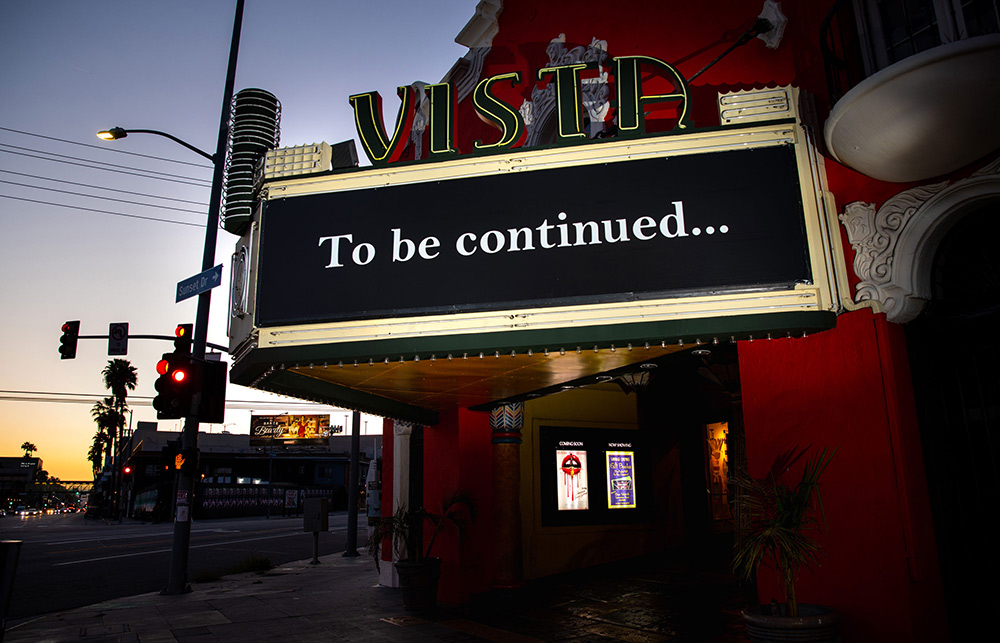
與疫情期間蔓延全美的博物館,、音樂廳、劇院關(guān)門潮一樣,,Cineworld關(guān)閉美國536家Regal影院,,并給4萬名員工放無薪假的決定雖然讓人感到非常痛苦,但也可以理解,。上周情勢又進(jìn)一步惡化,,原因是全美最大連鎖影院AMC宣布其資金流僅足以支撐至今年年底,。
作為一名編劇,,由于早年深受《性、謊言與錄像帶》(Sex, Lies, and Videotape),、《為所應(yīng)為》(Do the Right Thing),、《魔域煞星》(Dreamscape)等電影的影響,,我在書案前度過了無數(shù)個改編劇本的日日夜夜。在我看來,,美國的觀影方式早就應(yīng)該進(jìn)行改革,,我也希望本次停業(yè)潮能夠成為一個契機(jī),徹底改變美國人的觀影方式,。
作為大片時代的產(chǎn)物,,超級影院就像飛機(jī)機(jī)庫一樣毫無特色和個性可言,一如對我們本能的拙劣妥協(xié),。聯(lián)網(wǎng)家庭影院的音響系統(tǒng)與無限制流媒體服務(wù)搶走了影院許多觀眾,,對Regal(美國影院數(shù)量第二多的連鎖影院集團(tuán),僅次于AMC)而言,,早在疫情之前,,逆轉(zhuǎn)局勢、搶回觀眾便已經(jīng)成為其刻不容緩的頭等大事,,而007系列新片的推遲上映(從今年秋季延檔至2021年4月)更是成為“壓垮駱駝的最后一根稻草”,,直接導(dǎo)致Regal宣布停業(yè)、放假,,這一事件讓超級影院“繁榮-蕭條”經(jīng)濟(jì)模式的脆弱本質(zhì)暴露無遺,,正可謂“眼見他起高樓,眼見他樓塌了”,。
連鎖影院早已深陷困境之中,,我搬到紐約北部時,這里的Regal影院便有小便池與噴泉處于損壞狀態(tài),,此后八年竟無人修理,,其財務(wù)拮據(jù)程度可見一斑。
作為消費(fèi)者,,無論影院如何,,我們都少不了要去看電影。但捫心自問,,我們會用同樣的態(tài)度去對待餐館或博物館么,?ArcLight、IPIC,、Alamo Drafthouse等配備有舒適座椅,、食品、成人飲品,、專業(yè)排片人員的小型影院的出現(xiàn)為未來更好的觀影方式指明了方向,。
但紐約對想要吸引成年觀眾的展映商(比如:在伊薩卡深受人們喜愛的本地非營利性影院Cinemapolis)并不友好,現(xiàn)行法律規(guī)定,,所有提供飲料的店家都必須備有全功能廚房,、餐桌服務(wù),,并且每個供應(yīng)酒水的座位都要配有餐桌。(州長兩度試圖修改法律,,但均遭州參議院駁回,。)
20世紀(jì)40年代末,最高法院在審理一起案件時判定,,華納兄弟,、米高梅等電影制作公司不得自有、自營電影院,,派拉蒙也接受了相關(guān)法令,。今年8月,司法部宣布廢止此類法令,,這一決定標(biāo)志著一股創(chuàng)新浪潮即將來臨,。不過我們已經(jīng)可以猜到這波創(chuàng)新的模樣。2019年,,迪士尼拿走了全美40%票房,,毫無疑問,該公司也將成為這波潮流的引領(lǐng)者,,將影院改造成"景點(diǎn)",,讓觀眾融入設(shè)計精妙的娛樂氛圍之中。
但看電影并不僅僅是為了娛樂,,更是為了獲得那種旅行,、探索、感受共鳴,、迎接挑戰(zhàn)并脫胎換骨的體驗(yàn),。很難想象《月光》(Moonlight)、《請以你的名字呼喚我》(Call Me by Your Name)或《寵兒》(The Favourite)等擁有豐富內(nèi)涵,、精彩絕倫的奧斯卡獲獎影片會出現(xiàn)在迪士尼的天幕之上,,這種電影需要人們走進(jìn)影院與親友一同觀看,并就影片中未解答的問題和話題進(jìn)行大量討論,。更難想象的是上述討論會出現(xiàn)在迪士尼樂園的藍(lán)海灣餐廳之中,。
新冠疫情期間出現(xiàn)的另一種模式或?qū)⒊蔀槲磥淼陌l(fā)展方向。
上周我原計劃前往多倫多在Inside Out電影節(jié)展映一部新的短片,,但由于疫情影響,,本次電影節(jié)只得轉(zhuǎn)為線上舉行,所以原本排滿兩個周末的影片展映,、問答及電影制作人共進(jìn)晚餐環(huán)節(jié)改為了影片線上售票,。這就使得那些沒有發(fā)行、沒有知名演員參演,、沒有炒作甚至宣發(fā)費(fèi)用,、只能夠在電影節(jié)上看到的電影也得以通過流媒體走入更多觀眾的視野。我希望在疫情之后,,圣丹斯電影節(jié),、特柳賴德電影節(jié)、戛納電影節(jié)等于偏遠(yuǎn)之地舉辦的高標(biāo)準(zhǔn)電影節(jié)依然可以沿用這種借助網(wǎng)絡(luò)進(jìn)行線上公映的展映方式,。
不過這種巧妙方法也有一個問題,,就是人們不再需要前往影院觀影,而如果我們不再像以往那樣與他人一同觀看電影,,那么我們可能也無法感知藝術(shù)的強(qiáng)大力量,。在《詩學(xué)》(Poetics)一書中,亞里士多德認(rèn)為,,宣泄,,即通過在觀眾與角色之間建立深層聯(lián)系來獲得一種凈化、重新覺醒的體驗(yàn),,是偉大戲劇最核心的效果,。
但在他那個時代既沒有Reddit上的StartledCats版塊,也沒有Oculus Quest,。如今在家中觀影就如同在音樂廳外聽交響樂一樣,,注意力很容易被分散,幾乎不可能達(dá)到亞里士多德所推崇的那種感覺深度,。
影院是宣泄情緒的最佳環(huán)境,,但也需要調(diào)整自己的態(tài)度與品位。電影本身是我們文化的深刻反映,,影院也應(yīng)如此,。(財富中文網(wǎng))
奧斯汀·邦恩是一名編劇,在康奈爾大學(xué)的表演與媒體藝術(shù)系任副教授,。
譯者:梁宇
審校:夏林
與疫情期間蔓延全美的博物館,、音樂廳、劇院關(guān)門潮一樣,,Cineworld關(guān)閉美國536家Regal影院,,并給4萬名員工放無薪假的決定雖然讓人感到非常痛苦,但也可以理解,。上周情勢又進(jìn)一步惡化,,原因是全美最大連鎖影院AMC宣布其資金流僅足以支撐至今年年底。
作為一名編劇,,由于早年深受《性,、謊言與錄像帶》(Sex, Lies, and Videotape)、《為所應(yīng)為》(Do the Right Thing),、《魔域煞星》(Dreamscape)等電影的影響,,我在書案前度過了無數(shù)個改編劇本的日日夜夜,。在我看來,美國的觀影方式早就應(yīng)該進(jìn)行改革,,我也希望本次停業(yè)潮能夠成為一個契機(jī),,徹底改變美國人的觀影方式。
作為大片時代的產(chǎn)物,,超級影院就像飛機(jī)機(jī)庫一樣毫無特色和個性可言,,一如對我們本能的拙劣妥協(xié)。聯(lián)網(wǎng)家庭影院的音響系統(tǒng)與無限制流媒體服務(wù)搶走了影院許多觀眾,,對Regal(美國影院數(shù)量第二多的連鎖影院集團(tuán),,僅次于AMC)而言,早在疫情之前,,逆轉(zhuǎn)局勢,、搶回觀眾便已經(jīng)成為其刻不容緩的頭等大事,而007系列新片的推遲上映(從今年秋季延檔至2021年4月)更是成為“壓垮駱駝的最后一根稻草”,,直接導(dǎo)致Regal宣布停業(yè),、放假,這一事件讓超級影院“繁榮-蕭條”經(jīng)濟(jì)模式的脆弱本質(zhì)暴露無遺,,正可謂“眼見他起高樓,,眼見他樓塌了”。
連鎖影院早已深陷困境之中,,我搬到紐約北部時,,這里的Regal影院便有小便池與噴泉處于損壞狀態(tài),此后八年竟無人修理,,其財務(wù)拮據(jù)程度可見一斑,。
作為消費(fèi)者,無論影院如何,,我們都少不了要去看電影,。但捫心自問,我們會用同樣的態(tài)度去對待餐館或博物館么,?ArcLight,、IPIC、Alamo Drafthouse等配備有舒適座椅,、食品,、成人飲品、專業(yè)排片人員的小型影院的出現(xiàn)為未來更好的觀影方式指明了方向,。
但紐約對想要吸引成年觀眾的展映商(比如:在伊薩卡深受人們喜愛的本地非營利性影院Cinemapolis)并不友好,,現(xiàn)行法律規(guī)定,所有提供飲料的店家都必須備有全功能廚房、餐桌服務(wù),,并且每個供應(yīng)酒水的座位都要配有餐桌,。(州長兩度試圖修改法律,但均遭州參議院駁回,。)
20世紀(jì)40年代末,,最高法院在審理一起案件時判定,華納兄弟,、米高梅等電影制作公司不得自有,、自營電影院,,派拉蒙也接受了相關(guān)法令,。今年8月,司法部宣布廢止此類法令,,這一決定標(biāo)志著一股創(chuàng)新浪潮即將來臨,。不過我們已經(jīng)可以猜到這波創(chuàng)新的模樣。2019年,,迪士尼拿走了全美40%票房,,毫無疑問,該公司也將成為這波潮流的引領(lǐng)者,,將影院改造成"景點(diǎn)",,讓觀眾融入設(shè)計精妙的娛樂氛圍之中。
但看電影并不僅僅是為了娛樂,,更是為了獲得那種旅行,、探索、感受共鳴,、迎接挑戰(zhàn)并脫胎換骨的體驗(yàn),。很難想象《月光》(Moonlight)、《請以你的名字呼喚我》(Call Me by Your Name)或《寵兒》(The Favourite)等擁有豐富內(nèi)涵,、精彩絕倫的奧斯卡獲獎影片會出現(xiàn)在迪士尼的天幕之上,,這種電影需要人們走進(jìn)影院與親友一同觀看,并就影片中未解答的問題和話題進(jìn)行大量討論,。更難想象的是上述討論會出現(xiàn)在迪士尼樂園的藍(lán)海灣餐廳之中,。
新冠疫情期間出現(xiàn)的另一種模式或?qū)⒊蔀槲磥淼陌l(fā)展方向。
上周我原計劃前往多倫多在Inside Out電影節(jié)展映一部新的短片,,但由于疫情影響,,本次電影節(jié)只得轉(zhuǎn)為線上舉行,所以原本排滿兩個周末的影片展映,、問答及電影制作人共進(jìn)晚餐環(huán)節(jié)改為了影片線上售票,。這就使得那些沒有發(fā)行、沒有知名演員參演、沒有炒作甚至宣發(fā)費(fèi)用,、只能夠在電影節(jié)上看到的電影也得以通過流媒體走入更多觀眾的視野,。我希望在疫情之后,圣丹斯電影節(jié),、特柳賴德電影節(jié),、戛納電影節(jié)等于偏遠(yuǎn)之地舉辦的高標(biāo)準(zhǔn)電影節(jié)依然可以沿用這種借助網(wǎng)絡(luò)進(jìn)行線上公映的展映方式。
不過這種巧妙方法也有一個問題,,就是人們不再需要前往影院觀影,,而如果我們不再像以往那樣與他人一同觀看電影,那么我們可能也無法感知藝術(shù)的強(qiáng)大力量,。在《詩學(xué)》(Poetics)一書中,,亞里士多德認(rèn)為,宣泄,,即通過在觀眾與角色之間建立深層聯(lián)系來獲得一種凈化,、重新覺醒的體驗(yàn),是偉大戲劇最核心的效果,。
但在他那個時代既沒有Reddit上的StartledCats版塊,,也沒有Oculus Quest。如今在家中觀影就如同在音樂廳外聽交響樂一樣,,注意力很容易被分散,,幾乎不可能達(dá)到亞里士多德所推崇的那種感覺深度。
影院是宣泄情緒的最佳環(huán)境,,但也需要調(diào)整自己的態(tài)度與品位,。電影本身是我們文化的深刻反映,影院也應(yīng)如此,。(財富中文網(wǎng))
奧斯汀·邦恩是一名編劇,,在康奈爾大學(xué)的表演與媒體藝術(shù)系任副教授。
譯者:梁宇
審校:夏林
Like the shuttering of museums, concert halls, and theatrical spaces across the country during the pandemic, Cineworld’s decisionto close all 536 Regal Cinemas in the U.S.—and furlough 40,000 employees—is at once both deeply painful and understandable. The news only got worse last week, as the largest chain, AMC Theatres, announced that it’s facing bankruptcy by the end of the year.
I’m a screenwriter, whose early experiences swept up in the power of movies (Sex, Lies, and Videotape, Do the Right Thing, and, okay fine: Dreamscape) have made me park myself in a chair for untold hours trying to reproduce it. The American way of moviegoing is long overdue for a “page one” rewrite, and I hope that these closures might serve as the inciting incident of a profound transformation in how we experience movies.
Megaplexes, designed during a blockbuster era of moviegoing, resemble airport hangars, with no discernible atmosphere or curatorial imprint, and “concessions” conceding to our worst instincts. Not surprisingly, before COVID, Regal (second in the U.S. in number of theaters only to AMC) was in desperate need to win back audiences from their dialed-in home theater sound systems and infinite streaming options. The fact that one movie getting bumped from this fall to April 2021—the next James Bond—triggered Regal’s announcement reveals the tenuous nature of megaplexes’ boom-or-bust economic model. The dinosaurs got very big before they got very dead.
The plight of chain movie theaters was already serious. The men’s bathroom at the local Regal here in upstate New York has had broken urinals and a broken water fountain since I moved here. How financially strapped—or checked out—do you have to be to let the same urinal go unrepaired for eight years?
As consumers, we’ve been going to the movies almost in spite of the movie theaters themselves. Could you imagine saying the same about a restaurant or a museum? ArcLight, IPIC, and the Alamo Drafthouse phenomenon—plush seating, food, and adult beverages at smaller-scale theaters with actual cinema programmers at the helm—point to a better future of moviegoing.
But here in New York, the current law works against exhibitors—like Ithaca’s beloved local nonprofit Cinemapolis—trying to appeal to grownups. Serving drinks requires having a full kitchen, table service, and a table for every seat where alcohol is being served. (The governor has tried twice to change the law, but it’s been stymied in the State Senate.)
In the late 1940s, the Paramount consent decrees (decided in a Supreme Court case) prohibited movie studios like Warner Bros. and MGM from also owning and operating movie theaters. This August, the Justice Department terminated the decrees, which signals that a wave of innovation might be coming. But we already can guess what it will look like. Disney accounted for 40% of the U.S. box office in 2019, and there’s no doubt it will lead the charge, remaking theaters into “attractions,” enveloping us in highly polished entertainment.
But I don’t just go to the movies to be entertained—I go to travel, discover, empathize, be challenged, and come out changed. It’s difficult to imagine brilliant, visceral Oscar-winners like Moonlight or Call Me by Your Name or The Favourite on the Disney marquee—the kinds of films that demand social viewings, in theaters, followed by rich conversations to explore their unanswered questions and provocations. It’s even more difficult to imagine those conversations happening at Disneyland’s Blue Bayou Restaurant.
There’s another model at work right now, a consequence of COVID, that might prove to be a path forward.
Last week, I was supposed to be in Toronto at the Inside Out film festival, screening a new short film. But because of the pandemic, the festival had to go virtual, so instead of two weekends full of screenings, Q&As, and dinners with filmmakers, the festival released tickets to the films online. This meant that the kinds of films you might ordinarily only see at a film festival—those without distribution, or unknown actors, or simply no hype or marketing budget—were available to stream and take a risk on. I hope that highly selective and remote festivals like Sundance, Telluride, and Cannes can use these kinds of public access screenings even after the pandemic fades.
The only issue is that this smart workaround for movies misses the going part of moviegoing—and when we lose the communal aspect of watching together, we’re at risk of losing the substantial power of the art. In Aristotle’s Poetics, he argues that catharsis is the central effect of great drama—a feeling of purgation and reawakening forged from a deep link between the audience and the protagonist.
But he didn’t have the Startled Cats subreddit or my Oculus Quest to worry about. When we watch at home, when we watch with our attention scissored up by other screens, that amplitude of feeling is next to impossible, like listening to a symphony from outside the concert hall.
Movie theaters are the best environment for catharsis, but they need to respond to shifts in attitudes and taste. Movies themselves deeply reflect our culture. Theaters should as well.
Austin Bunn is a screenwriter and an associate professor in the performing and media arts department at Cornell University.






